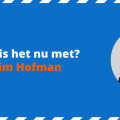
How are things going now with... manifesto 'Sharp on Elderly Care' | Issue Award winner 2017
In 2017, Carin Gaemers and Hugo Borst won the Issue Award for the manifesto 'Sharp on Elderly Care', in which they called on politicians to take responsibility and come up with solutions for the decline of elderly care. In this interview from the series 'How are things going...' we speak to Carin Gaemers – one of the two initiators of the manifesto – about this successful initiative and current developments surrounding the issue that they managed to put on the agenda so well.
What has happened to your initiative, the 'Sharp on Elderly Care' manifesto, since winning the Issue Award in 2017?
“We were very proud to win the Issue Award, but we were so busy campaigning that we couldn't even go to the awards ceremony. I still think that's a shame because it means we never got to see the people behind it. We think about it regularly because we are still busy.
A lot has happened since winning the award. Changes have been initiated, the image of elderly care has changed and elderly care will receive an extra 2.1 billion. But things are still far from going well. It was also stated in the manifesto that change is largely a change in mentality. Looking at healthcare differently, thinking about healthcare differently and looking at how you organize everything. That has only just begun. The struggle is still there, in fact, we are now of course taking stock before the elections. It is now four years later and we are still not far enough. That shouldn't take another four years.
The Issue Award helped a lot because it gave us a kind of brand very early in our campaign that said 'Hey, professionals think this has been handled well'. We succeeded because we came up with the right message at the right time that many people agreed with. You need support from society, politicians that go along with it, prizes and all those things together mean that people can no longer ignore you even if they wanted to. The Issue Award certainly played a role in this.”
How is the issue going at the moment?
“The system is still very much against us. When discussing child benefits, I see that a ministry is actually just as organized as healthcare. With people at the top who are good in their profession as directors or managers, or in the case of a ministry, senior civil servants. They are especially good at organizing work but have no intrinsic connection with it. There is a gap between that part of the organization where decisions are made and policy is made and that part where implementation is done. There's just no contact. And this is still the case at many healthcare institutions because they are generally too large. Then you get disadvantages such as loss of culture and connection in the organization. The initiators of the improvements are the organizations that had already made that change in thinking and doing before we came up with the manifesto. The organizations that had not yet done so are generally very large organizations that are stuck in their own sluggishness.”
To what extent are you still actively putting this issue on the agenda?
“It hasn't been quiet for a moment. Sometimes we work harder than others, but it has been non-stop behind the scenes. I sit at all kinds of tables where I would otherwise never have ended up and as a result I now have people on my phone that I would otherwise never call. This makes it easy to continue working on the campaign in the shade without always having to be in the spotlight.
Hugo and I both did not want to make this our life's work. We have agreed as long as there is movement and as long as we are taken seriously, we will continue. As soon as we don't add anything more, we will stop immediately, then we have made our contribution. And that actually still applies. I have always been involved in small, local initiatives. This is my way of working. Only this initiative is larger because it has national scope. You therefore have to keep short lines and stay close to the core of your subject, otherwise you will no longer have the right motivation.”
How did you manage to put this issue on the agenda so successfully?
“If you want to put an issue on the agenda, you should only focus on the core issue and not involve anything else. We started with nursing home care, because that is the environment we were familiar with. If we had started saying things about the sector that we were not 100% sure about, we would have been mowed down by those parties. We actually did this on the assumption that when we started, people from other parts of healthcare would come forward and experience this as well. But that didn't happen. That's why we started adding home care at one point.
What often goes wrong with grassroots movements like ours is that you have to participate in an industry and culture that is not your own. You are an outsider and before you know it you are already encapsulated. Myrthe Hilkens advised us very early on that we should implement the manifesto in such a way that we claimed ownership so that no one could run away with our story. That advice has been of crucial value.
There is nothing contrived about our campaign; what you see is what you get. For Hugo and me, the basis is simply anger and indignation about something we consider an injustice. We said that we only provide care. I also find it unbelievable when you appear on every talk show about different topics, then it is not about the topic but about you.
If you do what we did there is no one way to do it. You have to do it your own way, the way that suits you. If you start copying a way, the power and ownership disappear. Sometimes people want to put us in their favor, which makes it difficult. People have to step forward themselves. You have to be your own Chest and Gaemers.”
Which initiative from the past year do you think should win the 2021 Issue Award?
“I find that a difficult question. I see a paradigm shift in many different places. People from 'Black Lives Matter' who take space and stage, movements around climate issues, the young generation who stand up for their own interests. You see people stepping up and coming forward on all kinds of fronts and you think wow, this wouldn't have been possible four years ago. Then you wouldn't have been able to generate all that attention for this. So for me the power lies in the fact that it happens in many places at the same time. “
Issuemakers is an agency with extensive experience in creating and managing (social) issues, including in the field of healthcare. It is in our DNA to support organizations in this and provide them with the right advice.
For more information about this, please contact us at .




